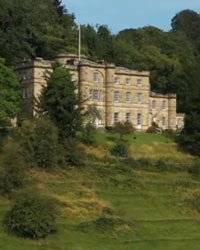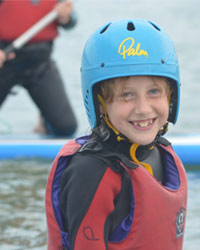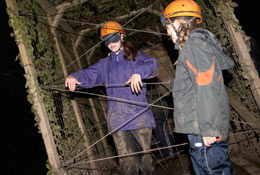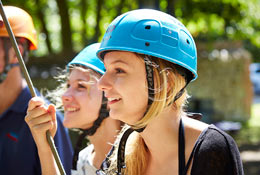The Importance of Teaching Skills in the Outdoors
 Manor Adventure
Manor AdventureFor years, text books, pictures and models in a classroom environment, with the school teacher explaining, demonstrating, or describing the processes involved was always the classic way to teach and for children and adults to learn. These days classrooms are still used, though some books and models have been replaced by DVDs, PowerPoint presentations and the internet. These tools are all used to provide an interactive explanation of the subject, or as an answer to a question asked.

Getting outdoors
Growing up and going to school in Snowdonia, I was lucky enough to experience learning outside the classroom, long before any badge or award for its inclusion in an education establishment was heard of. Our Geography lessons would be enhanced by a visit to Cwm Idwal, the Ogwen Valley, or a location relevant to the subject in question. Taking our textbooks with us, our teacher would take us and show us in 'real life' what was shown in the pictures. Most of the time it was the actual geographical feature or area that was in the photos; for example the Cwm itself with its Hanging Valleys or the Gribin Ridge could be seen and the explanation of how it was formed would make sense. I know for a fact this accelerated my own growing interest in the outdoors and the thought of maybe one day working in this environment. I don't know if I would have felt the same about the subject, sat in a classroom learning this subject by looking at the same pictures in a book, and having the teacher explaining glaciers and how they moved and created these features.
I have been a learner and a teacher/trainer on many different subjects throughout my career. As a learner I have experienced different styles and methods of teaching; some have been bad, some have been good. What I have been able to do as a teacher is reflect on both the good and bad learning experiences I have received. This information helps me develop an effective learning plan, hopefully meeting the learning needs of my students when I teach.
When you think back to your own learning experiences, I'm sure that one or two teachers stick out as being different for both good and bad reasons. Which ones did you learn from? I would take a guess that it's the ones that did something different. Did they add comedy to the lesson? Was it a hands on / physical lesson that had you moving around or was there a dramatic visual demonstration as part of the lesson. These are all things we remember and hopefully learn from. Sometimes it is too easy for teachers to just sit or stand in front of a class and hit play on a PowerPoint presentation and expect people to learn. I appreciate that there are some subjects that require this form of teaching, but you can always add something to enthuse learners.

A Case Study
At Manor Adventure's activity centres we use the Great Outdoors as our classroom. During residential school trips, taking children outside to participate in activities is a great way of allowing them to learn new subjects and skills, sometimes without them even realising it. What my geography teacher did with us years ago is now happening on a daily basis, and personally I know what a positive effect this type of learning had on me.
Due to the nature of some of our activities, ensuring a positive learning experience can be difficult to achieve when you are faced with peoples primary fears like heights or water. At Manor Adventure we believe in a "Safe Fun Learn" ethos. In simple terms, during activity sessions if learners feel safe or are in a safe environment, the addition of some fun to the session will allow them to learn from it.
It would be fair to say that many of our activities could not be run in a classroom environment, and I would be the first to agree. But over the years I have seen people teach subjects like map reading or nature in a classroom environment without stepping outside at all. I have observed people who get 100% in a classroom based map reading assessment, become lost and disorientated within minutes when they are taken outside and asked to do exactly what they did in the classroom.
Benefits of hands on learning
Learning new activities outside of the classroom as part of a residential trip gives many young people some new skills or challenges that many of us "oldies" take for granted. Some of the adventures or risks we took as children, building dens, exploring forests or climbing trees have been taken away in ‘real life', but they have been replaced by action / adventure games on consoles like PlayStation and Xbox. Experiencing the 'real' risk involved in climbing a tree as a child can be exciting, and if you make it up and down without falling you get a real sense of achievement which stays with you, well until you find your next bigger tree!! These days' children don't seem to get that same feeling of achievement from playing computer games. When climbing a tree on a computer game if you get it wrong you lose a life or restart the level without a sense of physical risk. Get it wrong in the real world and it's a sore arm, leg or head and maybe a trip to the hospital. But you will always remember it, and for some it will be a challenge that will not go away.
Carrying out new and challenging activities in a safe environment gives children the chance to experience and learn many new skills. Replacing the tree with a climbing wall, canoe or obstacle course gives the child a wide selection of safe situations in different environments for them to learn from. Each new activity will generate a set of skills; some of these skills will hopefully be remembered and taken to other activity sessions. Teamwork, effective communication and empathy can be learned on several of the activities we have. These skills can be learned at an early age and hopefully stay with you.
Everyone remembers the first time they climbed, went canoeing or rode a zip wire. What they also remember is the person that was there instructing or teaching them. This shows the importance of the instructor giving the participants a good positive activity session. Ensuring the participants remember the session for the right reasons rather than having a negative outcome that puts people off the subject or activity forever.
I am a great believer in the Learning Outside the Classroom ethos, from an early age I have learned more from being outdoors and trying new things than I probably have from being sat in a classroom environment. It is a formula that works and I believe will continue to work.
If you are interested in hearing a bit more about how Manor Adventure can help you with planning your next school visit then why not get in touch here.
Abernant Lake
Abernant Lake is an outdoor pursuits activity centre on the edge of the Breacon Beacons National Park. Our self contained 55 acre site gives schools the opportunity to experience a range of activities in a safe and caring environment.
view details..
Manor Adventure Isle of Wight
Manor Adventure is adding to its UK outdoor pursuits centres by opening a new venue on the beautiful Isle of Wight, for bookings in 2026. Find out more about our exciting new South of England centre.
view details..
Norfolk Lakes Activity Centre
Schools can enjoy a range of watersports and outdoor pursuits in our new activity centre, 11 miles from Norwich in East Anglia. As well as 37 acres of water, large indoor facilities provide a range of activities such as climbing, abseiling and more.
view details..
Culmington Manor
Culmington Manor is Manor Adventure's flagship outdoor pursuits centre, based in the heart of the South Shropshire countryside. Experience and enjoy more than 35 adventurous activities on our 100 acre estate. Click to find out why we are so popular
view details..
Lockerbie Manor
Lockerbie Manor offer outdoor residential school trips during term time, and all inclusive family activity holidays during the summer holidays. Activities take place in the extensive Manor house grounds or at
view details..
Willersley Castle Outdoor Pursuits
 Manor Adventure will begin taking school groups at their new Willersley Castle outdoor pursuits centre after Easter 2022
Manor Adventure will begin taking school groups at their new Willersley Castle outdoor pursuits centre after Easter 2022
Water Sports for experiential learning
 Simon at Crosby Lakeside talks to us about using outdoor activities and watersports to help deliver experiential learning environments.
Simon at Crosby Lakeside talks to us about using outdoor activities and watersports to help deliver experiential learning environments.
Skills for Life
 UKSA talk about their Skills for Life (S4L) framework measuring personal development whilst on a residential visit at UKSA
UKSA talk about their Skills for Life (S4L) framework measuring personal development whilst on a residential visit at UKSA
Residential outdoor learning in Scotland
 How a small family run company offering sailing lessons grew into one of Scotland's premier residential activity centres
How a small family run company offering sailing lessons grew into one of Scotland's premier residential activity centres
The Camp Hill Estate - Outdoor Outcome Led Experiences
 We talk to Camp Hill their residential activity centre and how they create an all-encompassing programme for every young person
We talk to Camp Hill their residential activity centre and how they create an all-encompassing programme for every young person










 Subscribe
Subscribe